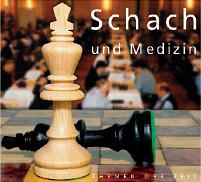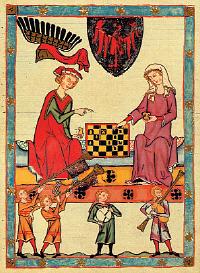

courtesy of Deutsches Ärzteblatt:

| |
Beginnings of chess are assumed in myths and legends. It is said that it was invented to consolate an indian queen who was sad about the death of her son. But also it is said that it should heal Amel-Marduk who had cut to 300 pieces his father Nebukadnezar from his mania. So to speak a symbolic game of the cruel reality.
For sure there is an analogy to indian war tactics: two battle rows confronted with the farmers as infantery, the towers as war elephants, the horses as cavallery and the runners as messagers. In a peaceful "fight" some deathbringing agression can be sublimed.
As always there is an ambivalence: The game can be misused to practise war. Napoleon (a lousy chess player) had said at the evening before a real battle: "The figures are set up. The battle can begin!"
The arabian historiy specialist al-Masudi told about the chess playing obsession of the Indians around the year 1000 in his travel diary. He said they played for money and with grand passion. Once a player had lost all money he played for his extremities. For that they cooked an ointment in a little pot to cover the wounds and stop the bleeding.
A first medical statement is from Ibn Masawaihi the
personal doctor of the Kalif Harun al Rashid who was asked if playing chess
would be ok also during an illness. He answered that it would be generally
allowed and only in special cases not recommendable.
In Arabia and Persia chess was very popular but had to fight against the islamic
clerus (like later against the christian in Europe later). Ibn ul Mutâzz tells
a critic: "You are judging chess but you must know why we love it: In it is
knowledge, it calms the lover who is threatened by jealousy, it teaches warriers
in their 'art' and is always there when we need it. It lowers the pain, it stops
the drinker from excessive drinking and are we in danger or in fear it is a
friend of our lonelyness."
Slaves and sons of Kalifs
Chess was played by slaves as well as by sons of Kalifs, by women and men. The
persian wise man Omar Khayam says: "World is a chess board, day and night
where fate moves men around, pushes them offers chess, beats and puts them in
the box."
In Europe medical hints for chess go back until the 12th century. Moses Sefardi
von Huesca, the doctor of King Alfons I. of Aragon recommends in his
"Disciplina clericalis" chess for the education of young wealthy
people. It is among the seven knight´s abilities like riding, swimming, archery,
boxing, hunting and making rhymes. Alfons X. the wise writes in 1283: "Chess
offers distraction to men when harm and pain is overwhelming them."
In a chess article by a dominican preacher Jakobus de Cessolis (end of the 13th century) the divine order is explained in analogty to chess. His special attention is to teach and improve the abilities of the kings and to make them overcome their lazyness. The fat eof the king is dependant on the little farmer (just besides. the farmer of the dame was said to be the doctor) who can beat him. This article was the most spread book after the bible that shows how popular chess was.
 |
|
| At the chess championship for
doctors: Dr. med. Helmut Pfleger watches the exhibition about the 10th anniversary of the championship. He had initiated it together with the "Deutsches
Ärzteblatt" |
|
Cardinal Damiani was embarassed in a letter to pop Alexander II. about the bishop of Florence who had played chess in a pub and thus had made the hand dirty which should work fo rthe Lord with some distraction. As punishment he had to pray psalters and wash the feet of 12 poor people.
Similar Maimonides (1155 to 1204), a famous author of medical articles meant that extreme chess players could not be accepted as serious in fornt of court. Bernhard of Clairvaux banned chess as a "carnival joy", on the other hand pope innocence III. who played chess understood it much better. "If someone playes chess and after that gets into trouble with someone and kills him this will be seen not as accident but as killing.
At any time chess players thought about their motives to play. Surely it is more than the risk to win or to loose which you can have with any other game. Do women who like chess less remember the oedipal conflict triangle in which the (male) player fights with his mighty dame (mother) the enemy king (Vater) but in this ambivalence identifies with the own king? This is without guilt complexes because it works unconsciously with a similar fascination like in fairy tales where king, queen and princes symbolize the own family story....

| |
| In the big Heidelberg Lied
manuscript from the 14th century the poets are represented with a
picture: Markgrave Otto IV. of Brandenburg is playing chess with his
dame.
picture: Verlagshaus Stuttgart |
|
To assume this people don´t like. "Shocked by the reasonless being pushed through life, frightened by thed accidential death the chess player searches for a world where he himself is the cause of his action, a game which does not know the accidential event. ...
So chess has become what it is: a ritual proved by history over more than 1000 years - art, science and religious service at the same time." (Jan Hein Donner, dutch great master).
Always chess had been recommended as therapy. It sounds strange to us if
arabian doctors wanted to influence the character and heal illnesses by certain
chess playing styles. For example melancholic patients should follow planned
strategies and phlegmatic patients had to keep off all schematism.
But the Menninger clinic in USA reports that severe contact disturbances had
been overcome last not least through chess.
Same results are reporte in living communities of psychic ill people in Munich.
Prisoners who played chess after their release to freedom were more peaceful
than others and had a better reintegration.
The medium chess as a brigde is impersonal enough to get in touch without being overloaded. Also the usual distance of about one meter to the opponent is a certain protection.
More than only entertainment
In a sublime way aggressive conflicts can be sublimed in playing chess and
contribute to an inner homeostasis.
It might also be like a "Unio Mystica" with kings and queens. So we
can understand Francis Bacon: "There is no better way out from the evils of
life than chess."
The politicians Franklin and Richard von Weizsäcker agree that chess is not only entertainment but you can aquire very useful capacities which serve you in other areas of life.
On the other hand chess in overdose can have disadvantages like dependance and even addiction. Kasparov and Kramnik said that professional chess is bad for health. Spassky is convinced that every year as world champion reduces his life expectance (like the profession of the doctors??)
Only history but always valid the description of a game with Bobby Fischer (against whom he lost his world championship in 1972): "We were in the fifth hour. Fischer was lost, destructed, without chance. I knew it and he knew it. But he sat there only for one hour. He calculated, calculated and calculated. Deep inside he screamed. He was pale like death but inside him there was a tension of one million Volt. I could feel how this tension ran against me over the table and then bounced back. At the end I screamed myself! If you play a game against Bobby Fischer it is not a question of winning or loossing - the game seems to be a mere survival test!"
Dr. med. Helmut Pfleger
See the ORIGINAL
site of this story in German in the archive of the "Deutsches
Ärzteblatt"!
share your experiences with the community and send it to Wolfgang[AT]Ellenberger.name
please with photos etc. as attachment! Or fill out
this simple hobby-form.
We give you all this for free and ask just for three little favours to make the world-wide community grow: |
||
| opt-in for FREE monthly newsletter | link to www.DoctorsHobbies.com from your site! | BECOME MEMBER! |
Check also the Site Policy including business rules |
...want to visit the DocLinks? |
|